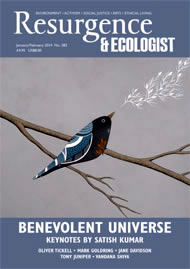The global co-operative movement has some 1 billion members and more employees than global corporations. Co-ops provide services weekly to 3 billion people. And since 2008, co-operative membership in Britain has grown by more than 20% to 13.5 million.
The strategic question then is: how might such diverse ‘good economy’ service providers co-create a coherent viable network?
The authors of this book, Angela Espinosa and Jon Walker, have been working on solutions to this complex adapted systems challenge. Both were close collaborators of Stafford Beer, a pioneer of complexity science.
Beer’s research showed why decision-making structures that work well and democratically for small organisations break down as organisations grow to a larger size. Beer’s insight was to show how a diversity of small bodies can sustain and extend participative democracy by uniting to operate as an expanding interconnected system. Taking his ideas from complex adapted systems in Nature – like the human body – Beer developed an interdependent model based on levels of recursion as an alternative to conventional command and control hierarchies.
He put into practice his decentralist democracy thinking. Indeed he led an ambitious project in Chile, under President Allende, to restructure the entire national economy. This Cybersyn project in 1972-73 aimed to make ‘wellbeing’ the goal of the economy and the replacement for GDP growth. Beer described Cybersyn as an explicit application of the Viable System Model (VSM) in Chile. As Espinosa and Walker show, Cybersyn was working by 1973 but was curtailed rapidly following Allende’s assassination.
VSM has evolved since those early days from a management to a wider focus. Consequently, as Espinosa and Walker explain, the methodology today enables organisations to co-evolve with their environment sustainably whilst retaining autonomy and self-production capacity. VSM demonstrates how democratic corporate organisations and social economy networks can become interdependent, with shared control systems that empower the small.
Co-op networks are part of the answer, and co-operative viable systems have begun to emerge. In the regions of Europe where co-ops have been most successful (e.g. the Basque country and Emilia-Romagna), there is some evidence of this. The Italian social co-op movement is a good example. Social co-ops democratically involve volunteers, paid staff, users and families in co-delivery systems. Social co-ops provide social care, education and health services to the most vulnerable groups in Italy, including the disabled, those with dementia, those suffering from drug or alcohol addiction, and ex-offenders. Most operate with a decentralist guideline to keep each co-op’s membership under 100. Beyond that they set up another one.
To secure operational economies, each social co-op is connected through a local co-operative consortium delivering shared services including technical help, training, access to social finance and joint tendering. The consortium provides functionally what Beer calls an essential VSM meta-system for shared and autonomous co-development. And as a result, social co-ops in Italy have expanded rapidly since 1991 to over 14,000, a distributed workforce of 360,000, services users of over 5 million and a combined turnover of €9 billion.
The book reports that in 1990 Walker utilised VSM at Suma Wholefoods to solve worker co-op decision-making and communication issues among the business units. Walker and Espinosa have introduced VSM practices successfully to the ecovillage movement in Ireland and to groups in Latin America. Walker has been teaching VSM to Transition Town groups in Yorkshire, to The Permaculture Association and to local food groups supported by the Plunkett Foundation.
VSM provides a common regulatory system for collaborative ventures. The methodology shows how to co-design and co-build sustainability partnerships among diverse, local economy actors, co-ops, small businesses and local authorities. These are complex relationships to govern. This book provides a comprehensive guide and proven examples. If the Great Transition to an ecological economy is to be achieved, we need a co-operative compass. VSM uniquely provides this.







